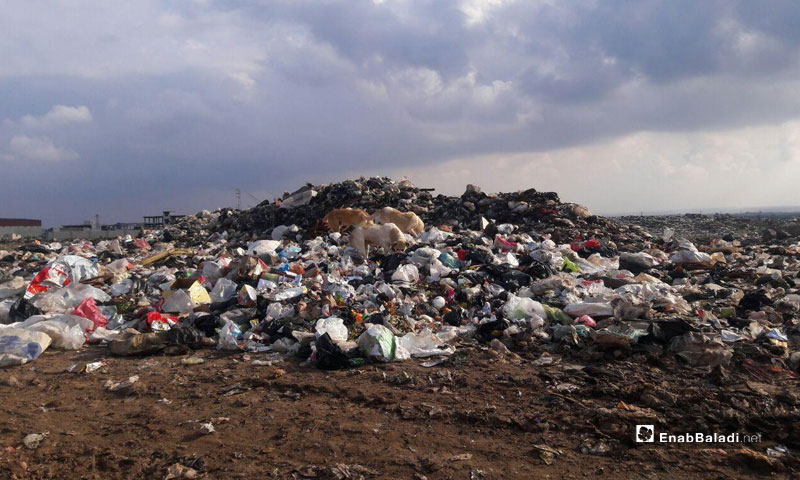



Dozens of dogs infected with rabies are spreading in the Daraa governorate in southern Syria, threatening the citizens’ lives and increasing the cases of infection with rabies. This is occurring amid silence and inability to address this phenomenon due to the significant lack of vaccines and the high prices of the antibiotics in the city’s hospital.
Enab Baladi has spotted cases of people who have contracted rabies, without being able to obtain appropriate treatments, in hospitals and clinics in the governorate.
One of the cases monitored by Enab Baladi is a 14-year-old boy who was bitten by a stray dog. According to his father, the boy was transferred to the “National Hospital” in Daraa, but the hospital did not have the necessary vaccines.
The child’s father, who preferred to remain anonymous for security reasons, said that he had to buy the vaccine through intermediaries, as the vaccines enter the province through trafficking at 30,000 Syrian pounds per injection, knowing that his son needs a dose of three injections within 40 days.
A nurse who worked at the “National Hospital” in Daraa, who preferred to remain anonymous, told Enab Baladi that rabies vaccines are not available in the hospital, and it can be provided by some pharmacies.
The nurse pointed out that after the regime’s control on the southern region, several families who had injured kids, asked him to find them the vaccine among the medical staff members, who were working during the opposition factions’ control of Daraa, but the inability of its conservation prevented its preservation.
The nurse and some families, interviewed by Enab Baladi in Daraa, indicate that many cases were taken to Damascus or the Quneitra governorate, while some confirmed that they purchased one injection at an amount of 30,000 Syrian pounds.
Ashraf Bermo, the director of Daraa health, spoke about 120 cases of rabies as a result of stray dogs until July 7, 2019.
In statements to the government “Syrian TV”, he noted that the portion of the Daraa governorate of vaccines ranges from 20 to 25 injections at specified periods, stressing that this number is not sufficient in light of the increasing number of infected cases and the spread of stray dogs.
The Syrian regime government has been unable to find a radical solution to get rid of stray dogs, since its control on Daraa Governorate in 2018.
One of the citizens, whom Enab Baladi met in Daraa, spoke on condition of anonymity for security reasons and expressed his fears that his children might get injured while going to school, especially in light of the loss of the vaccine. He pointed out the spread of dogs on dumpsters and the outskirts of villages. He called for people’s joined forces with the government to eliminate them by poison or sniping.
The government newspaper, Al-Baath, published a report, on July 4, 2019, in which it mentioned the people’s appeal to the regime’s government to find them a fundamental solution on this matter.
Wasima Khallaf, a member of the Executive Bureau of the Daraa Governorate, considered that “lanate foods” are the “best solution to reduce the phenomenon”, but those who are responsible for the solution “did not adhere to the instructions of the Directorate of Agriculture, and the result was counterproductive”.
A veterinarian in Daraa Governorate, who spoke on condition of anonymity for security reasons, has confirmed that the governorate’s residents should notice some symptoms of the dog with rabies, which are emaciation, red eyes, continuous barking, aggression, and the significant saliva that carries the virus.
The doctor continued, in an interview with Enab Baladi, that the risk might be in a dog that did not show signs of rabies. So, it is necessary to control the victim after being bitten.
He advised, especially those who live near “dumpsters”, to stay away from stray dogs. He also called to take the rabies vaccine in the case of biting, no matter how simple the wound is, to prevent the possibility of the dog being a carrier of the virus.
According to estimations of the World Health Organization, rabies causes tens of thousands of deaths annually, mostly from Asia and Africa, and children under the age of 15 make up 40% of people who are exposed to bites suspected of rabies.
The World Health Organization, the World Organization for Animal Health, the Food and Agriculture Organization of the United Nations and the global alliance for rabies control have set a global goal of achieving zero human rabies deaths by 2030.
if you think the article contain wrong information or you have additional details Send Correction